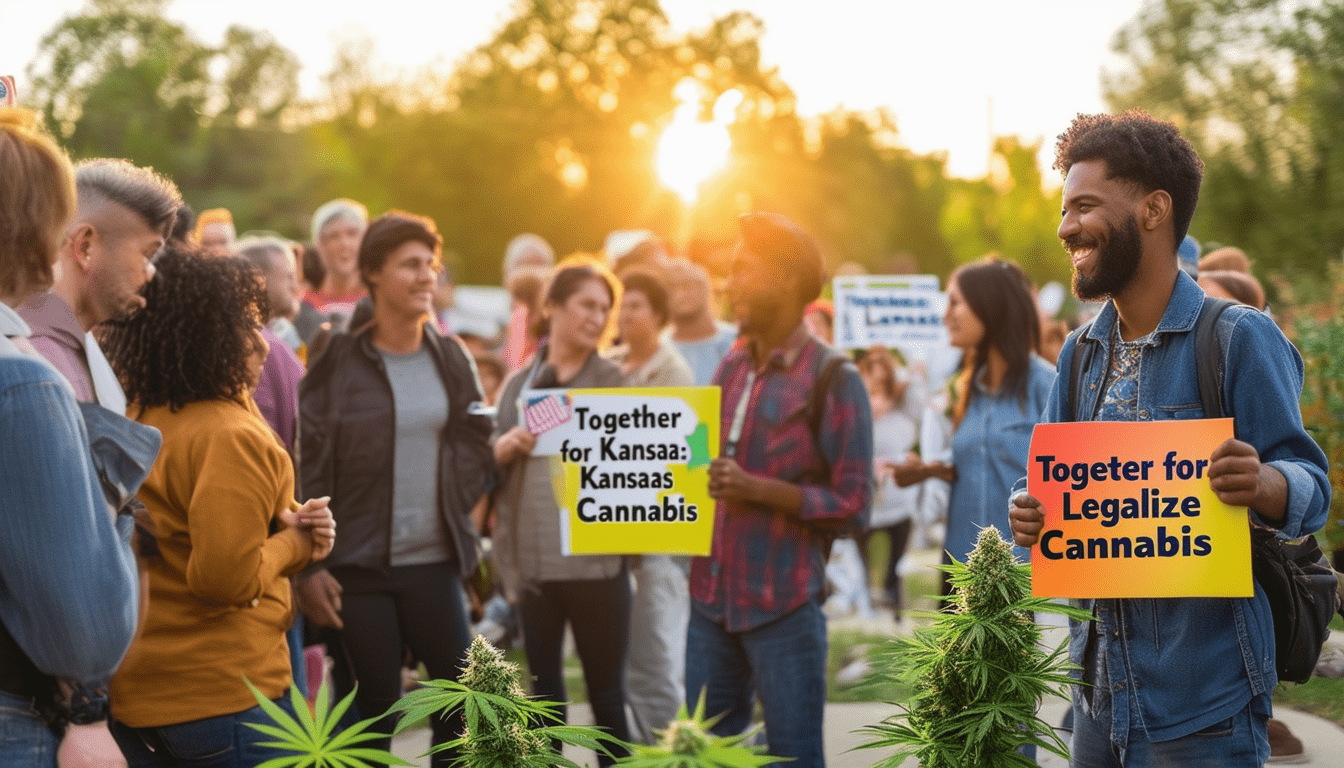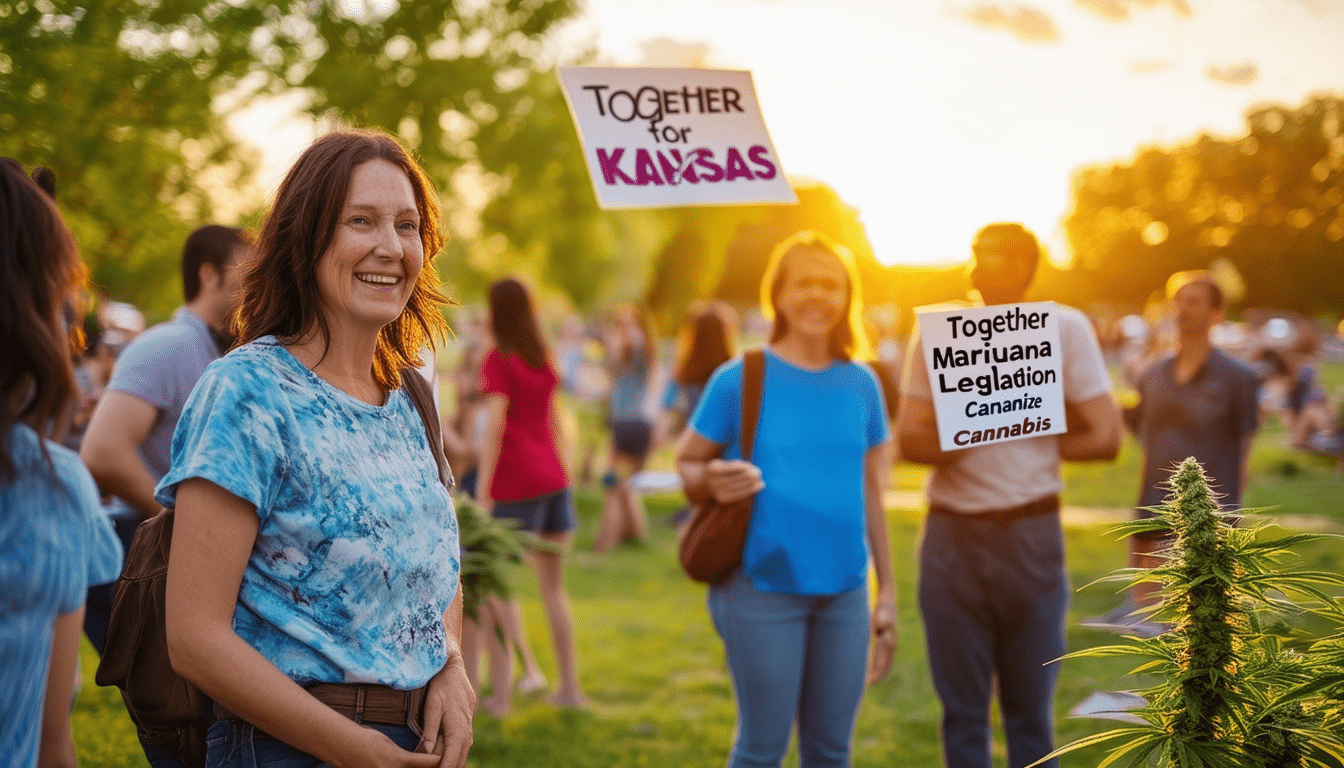Poll Reveals Strong Bipartisan Support Among Kansans for Marijuana Legalization as Lawmakers Postpone Medical Cannabis Reforms
|
IN BRIEF
|
In a recent survey, Kansas residents showcased a remarkable level of bipartisan support for marijuana legalization, despite lawmakers postponing crucial medical cannabis reforms. The poll indicates a significant majority favoring both medical and recreational cannabis, revealing that public sentiment leans heavily towards embracing legalization as a viable option for enhancing health care and generating state revenue. This growing consensus suggests that Kansans are increasingly willing to advocate for political candidates who align with this progressive movement.

A new survey conducted by Fort Hays State University indicates a significant majority of Kansans are in favor of both medical and recreational marijuana legalization, despite lawmakers’ hesitance to advance related reforms. The findings reveal a robust bipartisan endorsement for cannabis legalization, emphasizing the public’s growing demand for policy changes in the face of legislative delays.
Survey Results Showcase Widespread Support
The Kansas Speaks survey released recently illustrated that a striking 73 percent of respondents support the legalization of medical marijuana. Furthermore, there is a 61 percent backing for recreational use across the state. This demonstrates a compelling trend—a substantial portion of the Kansan populace is aligned with marijuana reform.
Interestingly, support for adult-use legalization rises to 65 percent when the potential for generating revenue through taxing marijuana products is highlighted. This reflects a pragmatic approach among voters who recognize the economic benefits such legalization could bring to the state.
Bipartisan Consensus on Cannabis Legislation
The survey highlighted a significant divide among political affiliations, yet revealed that regardless of partisan lines, Kansans generally favor legalization. Among Democrats, a noteworthy 79 percent are proponents of adult-use legalization, while 68 percent of independents and 52 percent of Republicans share a similar stance. This indicates that support for reform transcends traditional party dynamics.
For medical marijuana, there exists an overwhelming consensus, with 85 percent of Democrats, 74 percent of independents, and 64 percent of Republicans backing legalization. These figures signify that the push for reform is not merely a partisan issue, but a widespread demand among various demographic groups within the state.
Potential Impact on Political Elections
The implications of this data could drive candidates to adjust their platforms to align with public opinion, fostering a more responsive political environment. Elected officials may increasingly recognize that supporting marijuana legislation could enhance their electoral prospects.
Legislative Obstacles and Public Sentiment
Despite the clear public support, Kansas lawmakers have continued to delay the consideration of medical marijuana reforms, creating frustration among constituents who eagerly await change. The state has witnessed multiple attempts at legalization over the past few years, with various plans failing to pass through the legislature. For instance, a medical cannabis bill passed by the House in 2021 fell short in the Senate, showing a distinct disconnect between the public’s desires and legislative action.
Recently, a significant meeting of the Special Committee on Medical Marijuana was held, but reports indicate that no substantial progress towards legislation was made. Lawmakers proposed compiling a report on the feedback received during hearings without any decisive steps towards reform. The findings from the Kansas Speaks survey could potentially pressure legislators to reconsider their stance, given the notable consensus among their constituents.
Public Advocacy and Future Prospects
Governance in Kansas seems at odds with its constituents’ desires as leaders have urged residents to lobby their representatives for legislative change. Governor Laura Kelly has made statements urging the public to actively pressure lawmakers for action on medical marijuana. This creates an atmosphere of advocacy as the public gathers momentum to demand reform through active civic engagement.
With the upcoming elections on the horizon, the combination of strong voter support for cannabis legalization and increased public advocacy presents a pivotal moment for Kansas. This environment could lead lawmakers to reconsider their long-standing opposition and reflect on the realities of public opinion as they head into critical decision-making periods.
For more on cannabis legislation and the evolving dynamics in state politics, the recent undertakings of the DEA regarding cannabis rescheduling and Arizona’s pioneering recreational marijuana delivery services showcase how rapidly legislation can change, potentially influencing Kansas’s trajectory in the near future.
Bipartisan Support for Marijuana Legalization in Kansas
| Support Type | Statistics |
| Overall Support for Medical Marijuana | 73% |
| Support for Adult-Use Marijuana | 61% |
| Support for Taxing Cannabis Products | 65% |
| Democratic Support for Medical Marijuana | 85% |
| Independent Support for Medical Marijuana | 74% |
| Republican Support for Medical Marijuana | 64% |
| Voters Likely to Support Pro-Cannabis Candidates | 60% |
| Democratic Voter Support for Pro-Cannabis Candidates | 74% |
| Independent Voter Support for Pro-Cannabis Candidates | 59% |
| Republican Voter Support for Pro-Cannabis Candidates | 51% |

A recent survey conducted by Fort Hays State University has highlighted a significant trend among Kansas residents: a robust bipartisan majority supports the legalization of both medical and recreational marijuana. Despite this clear public backing, lawmakers are hesitating to advance medical cannabis reforms, much to the dismay of constituents eager for change.
Strong Support for Medical and Recreational Marijuana
The Kansas Speaks survey indicated that a remarkable 73 percent of participants favor the legalization of medical marijuana, while 61 percent support the broader legalization for recreational use. This overwhelming consensus reflects growing acceptance and a shift in public opinion regarding cannabis within the state.
When the survey’s respondents were asked about the potential to tax cannabis products to enhance revenues, support rose to 65 percent. This is notable, as it includes a majority from all political affiliations—79 percent of Democrats, 68 percent of independents, and even 52 percent of Republicans expressed their favor towards legalizing adult-use cannabis
Demographic Concordance on Marijuana Legalization
Support for marijuana legalization transcends demographic barriers, revealing a unifying stance throughout the state’s populace. A majority of respondents from diverse backgrounds, including age, education, and income level, agreed on the need for reform. Even more striking is the fact that more residents favor taxing marijuana than increasing taxes on cigarettes or alcohol.
Political Implications and Election Sentiment
As upcoming elections loom, the poll suggests that nearly 60 percent of Kansas voters would be highly or somewhat likely to support candidates who advocate for medical cannabis legalization. This sentiment is particularly strong among Democrats, with 74 percent expressing inclination to vote for pro-medical cannabis candidates. Independents and Republicans also showed significant support, with estimates of 59 percent and 51 percent, respectively.
Legislative Hesitation Amid Public Support
Despite the undeniable public support for cannabis legalization, lawmakers have stymied progress on medical marijuana reforms. The state legislature’s Special Committee on Medical Marijuana recently met but failed to advance any new measures, opting instead to compile information for future sessions.
Previous efforts at legalization have faced significant challenges as well. A medical cannabis bill passed by the House in 2021 ultimately stalled in the Senate, and lawmakers have faced repeated setbacks in their attempts to act on this pressing issue. Governor Laura Kelly has urged public engagement, emphasizing the need for constituents to demand action on cannabis legislation.
The Impact of Public Advocacy
The findings of this poll underscore the necessity for public advocacy in reshaping Kansas cannabis policy. Lawmakers who continue to dismiss widespread public sentiment risk losing voter support, particularly in an electoral climate increasingly favorable to cannabis reform. As citizens rally for medical and recreational marijuana legalization, they encounter an uphill battle against a historically conservative legislature.
As the landscape for cannabis laws evolves, the voices of Kansans are crucial. Advocates and eligible voters must remain proactive, urging lawmakers to reconsider their stances on medical cannabis and recognize the need for legislative reform that reflects the growing support among their constituents.
For those interested in the ongoing discussions regarding cannabis reform and the implications for Kansas, more information is available through the recent developments surrounding cannabis legalization.
Key Findings from the Kansas Marijuana Legalization Poll
- Support for Medical Marijuana: 73% of Kansans favor legalization.
- Adult-Use Approval: 61% support legalizing recreational cannabis.
- Tax Revenue Interest: 65% back adult-use legalization if taxed.
- Demographic Consensus: Majority support across age, education, and income levels.
- Political Willingness: 60% likely to vote for pro-legalization candidates.
- Bipartisan Support: 79% of Democrats, 68% of independents, and 52% of Republicans in favor of adult-use legalization.
- Medical Cannabis Urgency: 85% of Democrats support medical legalization.
- Legislative Delays: Lawmakers have previously stalled cannabis reform efforts.
Strong Bipartisan Support for Marijuana Legalization in Kansas
A recent survey from Fort Hays State University highlights significant bipartisan support among Kansans for legalizing both medical and recreational marijuana, even as lawmakers continue to postpone discussions on potential reforms. The findings reveal that a considerable majority of residents—73% favoring medical use and 61% supporting broader recreational access—are more likely to vote for candidates who advocate for marijuana legalization. This public sentiment presents a compelling case for the Kansas legislature to reconsider its stance on cannabis reform.
Understanding Public Opinion
The results of the Kansas Speaks survey indicate that a wide spectrum of voters, regardless of political affiliation, supports legalization efforts. With 79% of Democrats, 68% of Independents, and 52% of Republicans in favor of adult-use legalization, these numbers suggest that cannabis reform transcends traditional party lines. This growing consensus among the electorate reflects a potential shift in political priorities, where candidates may benefit from aligning their policies with the views of their constituents.
Generational and Demographic Insights
The data underscores that support for cannabis legalization is not limited to a single age group or demographic. Individuals across various educational and income levels are showing favor towards these reforms. This wide-ranging support indicates that Kansas residents are increasingly recognizing the potential benefits of legalizing marijuana—be it for improving healthcare access for patients or stimulating the economy through taxation and regulation of cannabis sales.
The Economic Argument
Legalizing marijuana presents a unique opportunity for Kansas to enhance its economic landscape. With 65% of survey respondents supporting the idea of generating tax revenue from cannabis sales, this could represent a substantial financial boon for the state. The preference for cannabis taxation as a revenue source outpaces support for raising taxes on traditional products like cigarettes or alcohol. Policymakers should leverage these insights to craft legislation that not only addresses public health and safety concerns but also stimulates economic growth through responsible cannabis regulation.
The Role of Political Candidates
The inclination of voters to support candidates who favor marijuana legalization reflects a shift in political dynamics. Approximately 60% of respondents expressed that they would be more likely to vote for politicians advocating for medical cannabis. Democratic candidates show the highest likelihood at 74%, with significant backing from independents and even a majority of Republicans. This data presents a strategic roadmap for candidates looking to align with public sentiment to enhance their electoral success.
Implications for Lawmakers
As legislators continue to hold off on discussing medical marijuana reforms, the clear message from the public cannot be ignored. The bipartisan support illustrated in the survey presents a compelling case for lawmakers to prioritize cannabis legislation in upcoming sessions. Advocating for the benefits realized in other states—such as increased tax revenues and improved health outcomes—can pave the way for sensible reforms in Kansas’ approach to marijuana policy.
Encouraging Civic Engagement
To facilitate this change, it is crucial for constituents to engage with their representatives and express support for cannabis reform. Grassroots efforts, coupled with an informed electorate, can place pressure on lawmakers to prioritize these discussions. Kansans must utilize platforms available to them, such as community discussions and town hall meetings, to voice their support and demand actionable reforms.
In light of the growing bipartisan consensus on marijuana legalization, it is imperative for Kansas lawmakers to reevaluate their stance on cannabis reform. The overwhelming public support indicates that the time for action is now, and both political candidates and constituents should work together to push for sustainable changes in the state’s cannabis policies.





Post Comment